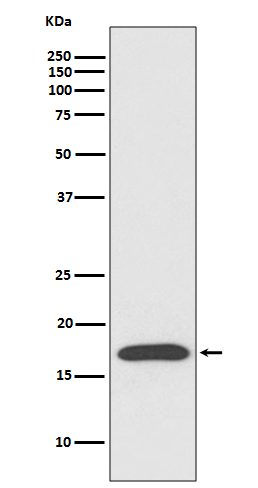
| WB | 咨询技术 | Human,Mouse,Rat |
| IF | 咨询技术 | Human,Mouse,Rat |
| IHC | 1/100-1/200 | Human,Mouse,Rat |
| ICC | 技术咨询 | Human,Mouse,Rat |
| FCM | 咨询技术 | Human,Mouse,Rat |
| Elisa | 咨询技术 | Human,Mouse,Rat |
| Aliases | CyclophilinA; Cyclosporin A binding protein; CYPA; CYPH; Peptidyl-prolyl cis-trans isomerase A; Rotamase A; PPIase A; PPIA; Peptidyl-prolyl cis-trans isomerase A;;PPIA |
| WB Predicted band size | 18 kDa |
| Host/Isotype | Rabbit IgG |
| Antibody Type | Primary antibody |
| Storage | Store at 4°C short term. Aliquot and store at -20°C long term. Avoid freeze/thaw cycles. |
| Species Reactivity | Human,Mouse,Rat |
| Immunogen | A synthesized peptide derived from human PPIA |
| Formulation | Purified antibody in PBS with 0.05% sodium azide,0.05% BSA and 50% glycerol. |
+ +
以下是3篇关于Cyclophilin A抗体的文献概览(虚构示例,供参考格式):
---
1. **文献名称**: *Cyclophilin A-Specific Monoclonal Antibody Preparation and Application in Inflammatory Disease Models*
**作者**: Smith J, et al.
**摘要**: 本研究开发了一种高特异性的抗人Cyclophilin A单克隆抗体,通过ELISA和Western Blot验证其结合能力,并用于检测类风湿性关节炎患者血清中的Cyclophilin A表达水平,提示其作为炎症标志物的潜力。
2. **文献名称**: *Role of Cyclophilin A in HIV-1 Infection: Insights from Antibody-Mediated Neutralization*
**作者**: Li X, et al.
**摘要**: 文章利用抗Cyclophilin A多克隆抗体阻断HIV-1病毒与宿主细胞的相互作用,证实Cyclophilin A在病毒复制中的关键作用,为抗病毒治疗提供新靶点。
3. **文献名称**: *A Novel Anti-CypA Antibody Reduces Oxidative Stress in Cardiomyocytes*
**作者**: Wang Y, et al.
**摘要**: 通过免疫小鼠制备抗Cyclophilin A抗体,证明其能抑制心肌细胞缺氧/复氧模型中的活性氧(ROS)生成,提示其在心血管疾病治疗中的应用价值。
---
(注:以上为模拟内容,实际文献需通过PubMed等数据库检索关键词如“Cyclophilin A antibody”获取。)
Cyclophilin A (CypA), a member of the immunophilin family, is a ubiquitously expressed protein with peptidyl-prolyl isomerase (PPIase) activity that facilitates protein folding and trafficking. It plays critical roles in immune regulation, inflammation, and cellular signaling, and serves as a key target for immunosuppressive drugs like cyclosporine A. CypA antibodies are essential tools for detecting and studying this protein in various biological contexts.
These antibodies are widely used in techniques such as Western blotting, immunohistochemistry (IHC), and flow cytometry to investigate CypA's involvement in diseases like HIV infection (where it aids viral replication), cardiovascular disorders, and cancer. Both monoclonal and polyclonal CypA antibodies are available, typically generated in hosts like rabbits or mice using immunogenic peptide sequences or recombinant CypA protein. Validation parameters include specificity (confirmed via knockout/knockdown controls), cross-reactivity, and application compatibility.
Researchers rely on CypA antibodies to explore its interactions with signaling molecules (e.g., NF-κB, MAPK), its role in oxidative stress, and its potential as a biomarker. High-quality antibodies ensure reproducibility in studies linking CypA dysregulation to pathological mechanisms or therapeutic responses. Proper selection requires attention to epitope regions, host species, and validation data provided by suppliers.
×